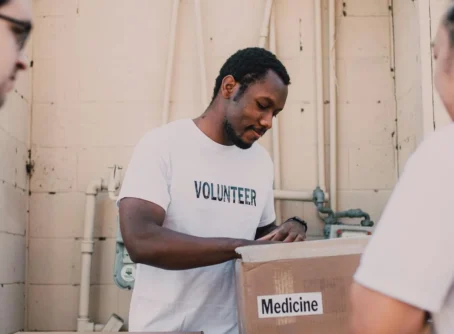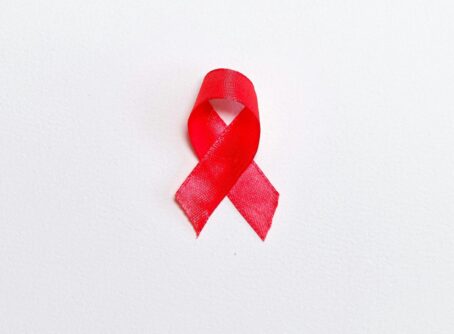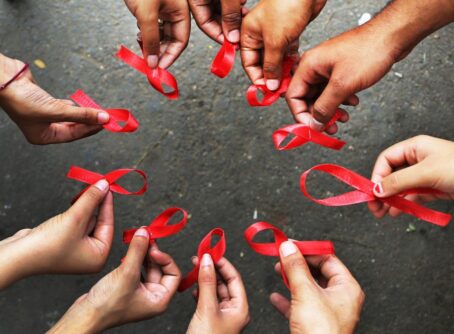
This interview is part of Shared Justice’s Transformative Justice series running throughout January and February. The series explores one of the most urgent areas for reform within the juvenile justice system: juvenile probation. Focusing on promising practices in diversion and prevention, including Credible Messenger Mentoring, the series will highlight opportunities for government and civil society to create a juvenile justice system that is more equitable, effective, and restorative.
KT: You serve as the lead pastor at The Path Church, and you’re also the co-founder of the AND Campaign, an organization committed to educating and organizing Christians for civic engagement. Why is it so important for Christians to not keep their faith within the walls of their church, but to seek the well-being of their neighbors through civic engagement in the public square?
AM: We shouldn’t keep our faith within church, on a Sunday morning within the building, in any area of our lives, right? Jesus doesn’t call us to simply show up to a worship service and spend the rest of our week doing what we want to do. And so I don’t see the political space or civic engagement as any different. And honestly, for me and my circles, I was just having a conversation recently, where folks were saying, ‘Can Christians even be politicians? Is that even possible?’ because they see the corruption. In their minds, you have to sell your soul to be a politician in the United States of America. You have to compromise. There’s no way to even get to a place of influence if you don’t. Unfortunately, that is what has been exemplified with many politicians.
And at the same time, I think there’s a lack of understanding on the broad term of civic engagement as well, and how there’s opportunities to serve in different ways other than being a senator or a mayor. You can serve with nonprofits, and you can serve with other organizations and advocacy and different things like that, where you’re not even in the limelight. But ultimately, if Christians can be a light in this specific space, then it just brings glory to God. I think about Matthew 5:16 and the Beatitudes where Jesus says, You’re the light, you’re the salt. Let your good deeds shine before people so that you may give God the glory. And so it’s an incredible way, especially right now, to bring glory to God in something that would be very different for people to see. And also in our evangelism as we strive to make disciples and help other people to know Jesus. If they can see that we truly are for people’s wellbeing, regardless of their political affiliation, their economic background, whether they are on this side of an issue or that side of an issue — if they can see that God’s love transcends all of that, then that may be something they want to be a part of and explore even more.
CPJ has been working to educate and equip people of faith to advocate for juvenile justice reform, and specifically juvenile probation reform. Why is this a topic that you are passionate about?
Well, I was in the system, personally, as a young person. I got arrested. I went to jail. I had to do community service. I had to deal with the consequences of bad decisions as a young man, just trying to navigate life. My mom was a single mom, and I grew up with two younger brothers. And so I was, in many ways, called to be the man of the house and to mature really quickly, without a very stable family unit. I wasn’t a Christian. I mean, we went to church, but I didn’t have or even really allow Christians to influence me. My closest father figures were my coaches in sports. And so there’s only so much that I was prepared to take on, and only so much that I was able to really understand about decision-making and the consequences that come from it. As a man, I just thought I was invincible. And I see that in many young men specifically, this sense of invincibility and we can do what we want.
And I’ve also been a victim of injustice, seeing the consequences for my actions being much more severe than the consequences of the actions of others who were involved in the same crime and situation as I was, but were white and had more resources and had parents that had more influence and money. So, seeing that, and experiencing that really was very traumatic for me, because it really shattered my trust in government and in police officers and them wanting to protect and serve. And I’m like, ‘This is not right. I know I was wrong, and there’s things that I’ve done. But what about them?’ And so just going through those things in my life has really helped me to understand what our young people go through, and helps me to be really compassionate as they go through it.
“First and foremost, we shouldn’t be defined by our worst decision.
It has also been hard seeing the families in our church whose children get in trouble with the law, especially as Christians who are striving to do what’s right, it’s so tough for them to go through this. It’s hard for them not to feel shame and guilt, because they’re Christians, their kids shouldn’t have these types of issues is what they think. But kids go through their own things and have to make their own decisions. So, I see how those situations affect whole families, and see the challenges even that the parents and the siblings go through while somebody they love makes some bad decision, breaks the law, or is falsely accused of something. I see the worldly side of it as non-Christian people are trying to deal with the system and decision making, injustice. But I also see the impact it has in the church. So that’s another reason why it’s important to me. You talk about blue collar families having to come up with so much money for them to get a lawyer that cares, not just a lawyer, but a lawyer that cares. And the process is just draining, because it takes so long, it takes so much energy and emotional energy. It really kind of hijacks your entire life for a time period, especially during that initial time of the arrest being made and trying to figure all that out.
A promising practice in juvenile probation reform is Credible Messenger Mentoring, in which “individuals from similar backgrounds, especially men and women who were themselves system-involved, engage youth in structured and intentional relationships that help them change their attitudes, beliefs, and actions.” Can you speak to the biblical motivations for the Church being involved and training members to serve as mentors, or supporting organizations that do this work?
I think that biblically, if we just look at the life of Jesus, you could say he was a mentor, and a credible mentor at that. He took on the big brother role with men and women, who were in totally different places in their lives, who had gone through so many different things, who had worked in different spaces. And he was there for them. He walked with them. It wasn’t a program where I will see you at this day and this time, and then I’ll see you again next week. It was a relational based program. It was intentional. He came down to seek and save the lost, but also to equip His disciples to be able to the same. And he knew that he had a short time. In three years time they were going to have to grow up and take on that mantle, of course with the Holy Spirit. But he was very intentional about that. And as it says in Hebrews, chapter four and five, he’s able to empathize with every single thing that we go through, and he’s been tempted. He was tempted in every way so he can understand all of our challenges and yet not only be compassionate, but also teach us how to overcome those challenges and be godly and be righteous and make an impact in this world. So I think Jesus is the best example of that mentorship model if we do it his way.
Then partnering with organizations. What I’ve learned as a pastor is that many churches aren’t equipped to handle every situation or meet every need. And honestly, that was one of the reasons why I was so all in when it came to creating the AND Campaign. I was at a place as a pastor where I didn’t feel equipped to handle all the social issues that were happening. And I wasn’t even equipped to teach Christians on how to deal with all of them. There were some things that I could do and I understood, but there were so many things that I didn’t. And when it comes to the political space, and civic engagement, I just didn’t know that much about it. I wasn’t well informed. And so as we created the AND Campaign, I’ve been able to benefit from it as well, because I’m able to say, ‘Hey, these are folks that are in it day in and day out, who are Christians, who are biblically based and are striving to make an impact. Reach out to them.’ And so it’s just been a great, great help, as a pastor, not feeling the pressure of having to meet every need or have expertise in every social issue.
One of the AND Campaign’s priorities is advocating for compassionate public policies. What might this look like for our young people touched by the juvenile justice system, and why is prioritizing compassion so important for this population in particular?
First and foremost, we shouldn’t be defined by our worst decision. There are so many external and internal factors that go into our decision-making as people. And I think about how much compassion we need as adults, whose brains have developed, who have had a chance to learn from our mistakes. Yet we still make mistakes. And I think about how much more our children, who are so vulnerable, are dealing with so many internal issues and external issues. And really as adults we should be circling them in prayer, supporting them, wrapping our arms around them. I see it every day. I serve as a character coach for Fellowship of Christian Athletes over at an inner city high school here in Atlanta, North Clayton High School, building relationships with these teenagers and getting to know their lives. I have no choice but to be compassionate. I can hear about a fight that happened, I can hear about them going to jail, I can hear about them being kicked out of school, and at the same time, hear the story behind it and what led to it. It’s not always bad intentions, it’s not always wanting to hurt somebody else. It’s getting caught up at the wrong place at the wrong time with the wrong people. It’s dealing with peer pressure. It’s dealing with grief. So many of these kids are dealing with grief, especially in this pandemic. You can see it on their Instagram profiles, most of them have somebody on their profile that they say RIP so and so, or free so and so from prison, because somebody they love is in the system, and they miss them. And they were a pivotal part of their lives and their upbringing, and now they’re gone. It’s almost like a death. So they’re grieving, and you look at them, and you see how hard it is for them to deal with these emotions. And it’s hard for adults. So you can only imagine what they’re going through as children. So I think that’s why it’s always important to lead with compassion. And once they know they’re loved, and once they know they’re understood, then they start opening up even more and are more open to our influence to help them to mature and learn from their mistakes, so that that one mistake doesn’t define them for the rest of their lives.
What is giving you hope or inspiring you these days as it relates to Christian political engagement?
One of the things that’s given me the most hope is seeing Gen Z be open to the Gospel, be open to relationships and mentoring relationships, and be open to being influenced on how to direct their energies for impact. For example, at Morehouse College here in Atlanta, these young men have transitioned from social media activists to actually being engaged. I think that through all that we saw in 2020, and even 2021, they realized that even protests were not enough. That actually, the protests became a springboard to seeing what they can get engaged with, when there are no protests happening, that can actually make change. And so we’re just running into these young men that are going for it, that are involved in community organizations that are involved in the civic space and political space. And now they’re open to relationships, through relationships they become open to the Gospel, and then through that they see Jesus, the real Jesus of the Bible, the revolutionary Jesus that took on the political establishment and even the religious establishment and who advocated for the least of these. And they say, ‘I want to be like that.’ And who better to partner with for impact than God himself, who has all the resources, who has all the wisdom, who has all the power, and even inspires us to have that heart of compassion, that motivation to serve, so on and so forth.
I just had a conversation the other day about it with a young man we were discipling and helping to become a disciple who went from totally buying into the narrative that church has no credibility because it’s not engaging the community, to over the last year building relationships with us and seeing how the church is involved and making an impact. But he is also seeing our personal lives and our marriages and our families. And now he’s at the place where it can’t get any better than partnering with God. And so that’s what gives me the most hope right now, young people that are searching for something. For God, really. They’re searching for something more, they may not know it before disciples meet them, and direct them to God. But ultimately, they’re searching for God and are excited about partnering with God to make an impact.
Angel Maldonado serves as the Lead Pastor of The Path Church, a culturally diverse congregation in Atlanta, Georgia with a vision to mobilize the next generation. He is the co-founder of the AND Campaign, a coalition seeking to improve how Christians engage politics and culture by asserting the justice and righteousness of Jesus Christ. Angel also mentors high school and college athletes as a Character Coach with Fellowship of Christian Athletes. He and his wife Christina have two precious daughters and live on the southside of Atlanta.
Katie Thompson is the Program Director of Shared Justice, the Center for Public Justice’s program for Christian college students and young adults. In 2015 Thompson co-authored Unleashing Opportunity: Why Escaping Poverty Requires a Shared Vision of Justice with Michael Gerson and Stephanie Summers. She also serves on behalf of CPJ as a steering committee member of Faith for Just Lending, a coalition dedicated to ending predatory payday lending. Thompson holds a Master’s of Public Policy from The Trachtenberg School of Public Policy and Public Administration at The George Washington University.





